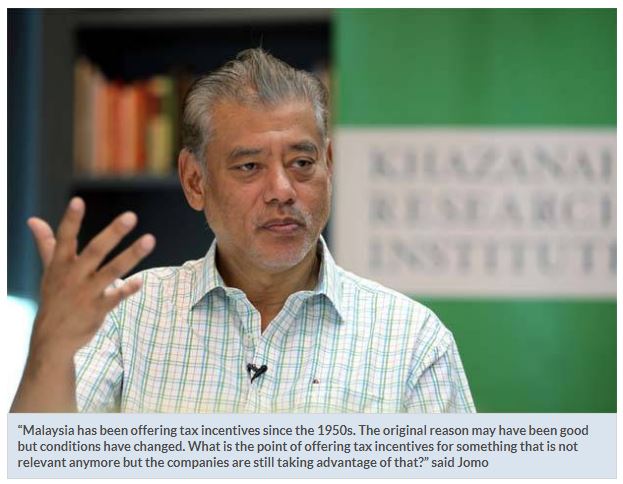Malaysia needs ‘smart taxation’
KUALA LUMPUR: Ahead of Budget 2020, prominent economist Prof Jomo Kwame Sundaram has called for “smart taxation” in Malaysia, which aims to increase the country’s tax collection without hiking tax rates.
Speaking to reporters at a media briefing, he said that it was important for the government to reduce or eliminate unnecessary tax exemptions offered to corporations and businesses operating in Malaysia.
“Right now, many companies in Malaysia are exempted from paying taxes for one excuse or another.
“Malaysia has been offering tax incentives since the 1950s. The original reason may have been good but conditions have changed. What is the point of offering tax incentives for something that is not relevant anymore but the companies are still taking advantage of that?” said Jomo, adding that there were many ways to improve taxation without even changing the tax rates.
Jomo pointed out that tax incentives should only be given to reward entrepreneurship, or to companies that invest to enhance the economic capacity of the country.
It is worth noting that the Pakatan Harapan government established the Tax Reform Committee last year to revamp the country’s taxation system, which will also include the rationalisation of tax incentives for investments.
Currently, Malaysia offers over 130 types of incentives administered by 32 Investment Promotion Agencies.
Jomo also suggested that taxes could be used to induce research and development (R&D) initiatives in certain sectors.
Using the domestic oil palm plantation sector as an example, he said there have not been any significant breakthroughs in oil palm-related R&D “for quite a long time”.
“The R&D efforts by the plantation companies are not enough, but you can understand the situation because any breakthrough by one company would be copied by the others. There is a free-rider problem.
“This is where the role of the government becomes important. You should tax the companies more and put more (money) and effort into R&D, ” he said.
Meanwhile, on other fiscal measures for Budget 2020, Jomo said the government should adopt an expansionary policy or increase its expenditure to further support the economy.
He also said that the country’s economic policies must consistently be counter-cyclical.
“One important area to look at is the bottom 70% of the country’s population. We must have policies to ensure that they are able to spend a bit more, with more breathing space for them.
“Additional income for the relatively less well-off translates into spending. An additional RM1 given to a wealthy person may not be spent, but if you give the additional RM1 to a poorer person, the person is likely to spend that money.”
For perspective, in a discussion paper released by Khazanah Research Institute on Sept 23, it was revealed that a whopping 70% of Malaysian households earned a monthly equivalised income of below RM3,015.
Jomo also said that the government must think of ways to increase aggregate demand, especially for goods that are produced in the country.
Meanwhile, he said the government must cancel “wasteful projects” that would not contribute to economic revival.
When asked to respond to Finance Minister Lim Guan Eng’s comment that “national considerations” prevented the government from cancelling the East Coast Rail Link (ERCL) project, Jomo insisted that the ECRL cancellation could still be done without hurting diplomatic relations with China.
“I’m not authorised to speak or to go negotiate for the Malaysian government, but I think there are many people who are quite competent in this country and who have the relevant experience who can negotiate this matter, without embarrassing China at all.
“I believe (China’s) president Xi Jinping, who has been strict on corruption in China, doesn’t want his flagship Belt and Road Initiative to be mired in controversy. That is why I believe that if we handle it correctly, it is still possible to reopen the issue, ” said Jomo.
The ECRL was suspended in July 2018 to give way to a review by the Pakatan Harapan government due to the project’s cost concerns.
However, the rail project was resumed this year after the signing of an improved deal, which saw the construction cost being reduced to RM44bil from RM65.5bil, while the portion for the local participation of the ECRL civil works rose to 40% from 30% previously.
Yesterday, Jomo presented the findings of the Trade and Development Report 2019 published by the United Nations Conference on Trade and Development (UNCTAD).
He pointed out that while a global recession was looming, most policymakers globally were unprepared for the economic downturn.
The report by UNCTAD has urged the international community to adopt a “Global Green New Deal” that seeks to break away from fiscal austerity measures, help bring a more equal distribution of income and reverse decades of environmental degradation.
Putting environmental concerns at the forefront without compromising on economic growth drivers, the report stated that decarbonising the global economy would require a significant rise in public investment, especially in clean transport, energy and food systems.
It added that a new generation of trade and investment agreements must be introduced to support policies aimed at creating a cleaner global economy.
With the Global Green New Deal in place, the developed economies’ gross domestic product growth rates are forecast to be 1% to 1.5% above those generated by current patterns of global demand.
As for the developing economies excluding China, the gains will be larger, ranging between 1.5% and 2% annually, but more moderate in China.
Source: https://www.thestar.com.my/business/business-news/2019/09/26/malaysia-needs-smart-taxation#ifhIoQoCB6PlMBbY.99


 Thailand
Thailand




